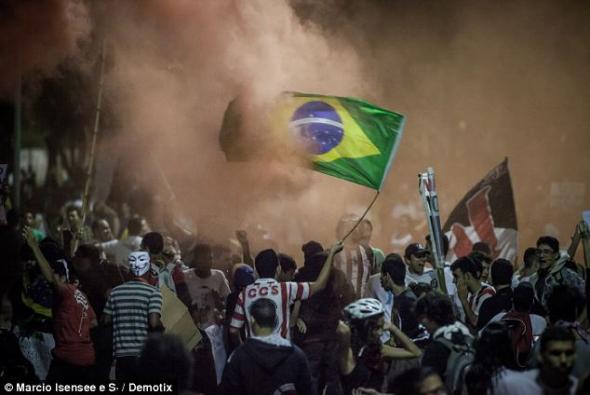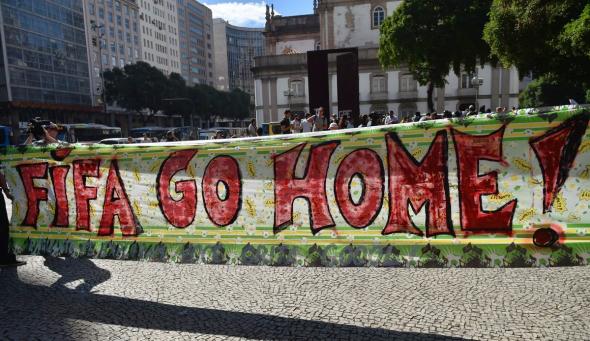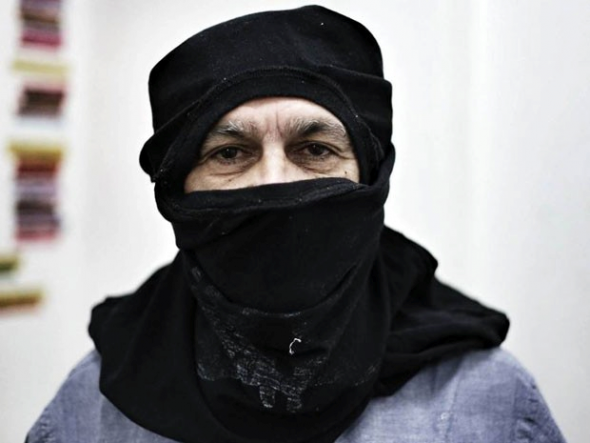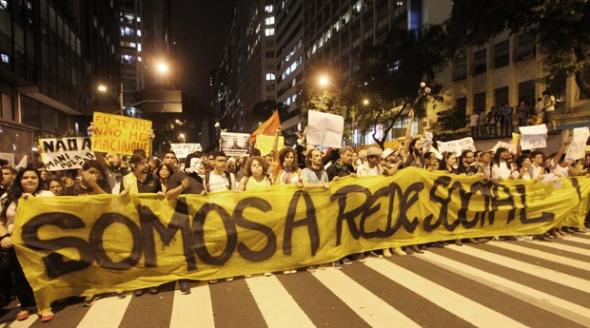What can't be reduced to abstract “masses”
It’s 5:30 pm in São Paulo and the temperature is 30ºC (plus 2º induced by hypnosis). In a neighbourhood next to Anhangabaú, a warm apartment devoid of greenery, two humans roast on a sheetless bed. A kettle warming in the kitchen demonstrates the laws of ebullition, and underground 5 million citizens fresh from work or pseudo-work squeeze together in rush hour frenzy. A faint glow stands for fire in a demonstration of the global warming of events; I light another cigarette in the petrol station and start writing.
What can’t be reduced to abstract “masses”
Dear readers of zines and independent publishing:
I am not sure if I will satisfy your expectations. Only the most obvious things occur to me. For instance, that the demonstrations on the streets of Brazil last June are not “concepts”, that is, transparent procedures to be liberally used in global games. Or that I hesitate to use plurals like “Arab SpringS” “encampmentS” or “Tahrir squareS” because, in spite of their linguistic availability, there is no such thing as a “repeatable” singularity. Or that the true demonstrations in Brazil were mainly demonstrations of potency, meaning they might obtain more potency (or more “might”) for its people. And that potency is hard to describe in dates, numbers, witness accounts and trajectories, and it is not reducible to “masses”, an opaque human lump moving in a single direction. Or that the demonstration is not over, it will go on tomorrow, until bodies pause or a text is written (for instance, now my spirit pauses momentarily over the screen). Or that movements in Latin America cannot be merely for show, to turn white European skin inside out and create a new faith, appeasing the disenchantment that permeated the last decades of European history because now “Asia and Latin America are all the rage”. There is an expression I love in Brazil: você pode até dizer que eu estou por fora (you can even say I’m out of it), sings Elis Regina in Como os nossos pais (Like our parents). Being “out of it” (estar por fora) is not fitting in, not knowing what’s going on, ignoring the state of current affairs and thus being unable to discuss them. I would love to think that we are all “out of it” in respect of understanding what’s going on in Brazil today. While our subjective antennae, our visual galaxies, keep trying to elect a new political faith, the inadvertent must be replanted. If the sole purpose of a massive movement of people were to illuminate other parts of the world, what use would it be to center any thoughts in Brazil, apart from providing some (the Europeans, for instance) with something to repeat, and others (the Brazilians, for instance) with a reference to be surpassed?
In truth, I would like to be able to explain this country that inhabits me a bit better. I am, however, an immature Brazilian, a Portuguese loaded with old world baggage, that moved to São Paulo less than 12 months ago and is still planting an inadvertent root around here. It is a strong root, but I do not think I can get this done without the aid of other people.

Two days after one of the biggest demonstrations – on June 20th there were millions of people on the street, covered by all the TV channels – I noticed a curious character that I had been following on social networks since I got here. Her public name was irresistible – Paula Professional Vandal Kossatz – and I had been following all her updates as she seemed to be deeply engaged and I was trying not to be left “out of it”.
That day, Paula posted a long text about all that happened since the first day she took part in a demonstration, in 2012, describing in detail the violent response of the Military Police. Of course, I must add that in Brazil there is no civilian police, only a military police force inherited from the dictatorship. I must also add that, at the time of the June demos, TV journalists called the tear gas bombs used by the police “moral effect bombs”.
But I digress. When I saw Paula Vandal Kossatz’s text, I immediately wanted to interview her for Jeux Sans Frontières. The portrait of the Brazilian demonstrations drawn by this Vandal (“vandals” is the word president Dilma Roussef and the television networks used to describe the population, in order to justify police violence), avoiding the tango of spontaneous revolution, almost drunk, practically ribald, seems important to reflect on an idea of “common” based on the interconnecting of individual experience.
Let us then open up a corridor, a microscopic trail of necessity. The demonstrations in Brazil have not even started yet. They open up pathways, redistribute the winds, they are researchers of desires, of anonymous faces. Paula is a name devoid of content, vandal, whirlwind.
INTERVIEW WITH PAULA VANDAL KOSSATZ
But when they broke down the gate, many other wishes were made manifest. We speak of wishes and not demands, because the latter can be satisfied. Collective desire implies a huge amount of pleasure involved in taking to the streets, feeling the multitudinary pulse, traversing the diversity of voices and bodies, sexes and types and grasping a “common” related to networks, to social networks, to collective intelligence.
Peter Pal Pélbart, text on the Brazilian demonstrations published in the newspaper “A folha de São Paulo”
Tell us a little about the appearance of dozens upon dozens of social movements in Brazil that led to the outbreak of demonstrations last June.
Actually, here in Brazil there is a huge lack of political awareness, especially over the past 30 years; I guess since the Directas Já movement in 19851 there were practically no strong mobilizations in this country. There was the impeachment of Fernando Collor de Mello2, of course, but that was a mobilization represented by Globo, and not necessarily “popular”. So, for over 30 years people have been without political debate, street debate, involving action and presence.
On the other hand, there is the so-called “crisis of representativity”. Everyone knows about it and plays dumb, thinking everything is OK, but it isn’t. The executive, legislative and judicial systems in Brazil are thoroughly corrupt.
That is what brings the social movements together, but actually their visibility, particularly here in Rio, clearly began with the World Cup and the Olympics, and the surge of evictions throughout the whole city, the privatization of the Maracanã and all the trouble with the residents of that area. The conflict became very strong. And since last year we had been protesting a lot at the Maracanã, even on behalf of the movements of the Guarani-Kaiowá3 Indians.
Then it exploded, that is, it became a fight against the model city, the standard city they are trying to design for the World Cup, increasing prices in the Southern Area4 and putting Pacifying Police Units in the slums5. Civil movements came together against this Rio de Janeiro that, from one day to the next, became more expensive than New York or Paris, and without any kind of public services.

How did the June demonstrations happen?
In São Paulo, the demonstrations started with the Free Pass Movement (that rebelled against price increases in public transport and fights for free mobility for citizens within the city). It started with a question: what is this transport they want to give us?
Then there was the Confederation Cup in Rio, and Sérgio Cabral (governor of Rio de Janeiro) meddled with the cariocas’ greatest passion – soccer – because he meddled with the carioca temple of soccer, which is the Maracanã. By putting the admission price to soccer games up to 250 reais he effectively deprived the cariocas of soccer. Consequently, on June 6th at the Maracanã, after what happened in São Paulo with the Free Pass, there were all sorts of people on the street; families and children came out to demonstrate. They protested everything: “there’s one and a half billion for the stadium, but no public transport! No health service! No education!” They went down the Rocinha slum shouting: “you want to build a new cable car but we’re asking for basic sanitation!”
It was obvious to everyone that THERE WAS MONEY, that Brazil was not a poor country. In other words, it was obvious that investment in the city is only for foreigners coming for the World Cup, and everything is being done with public-private partnerships. And, since June, since the big mobilizations, there are people on the street in Rio de Janeiro every single day, no-one is demobilizing! The situation here is absolutely clear…
Almost 3 months after the demonstrations, I feel that in Rio the June movements have been growing. Every day we hear about people taking to the streets, the movement hasn’t stagnated. But we also hear about police violence every day.
That’s true. But the Cup and the Olympics are responsible for that. And of course Rio is the “Cidade Maravilhosa”! The whole world is watching it because the World Cup Final will be at Maracanã, apart from Copacabana and Ipanema, women, caipirinha, beer, carnival, soccer… and a lot of money has been invested in it!
And everyone knows that today Brazil is still structured like a dictatorship that governs for the elites, only with these Mega-events to come, everything has become clearer, especially with police repression. For instance, the violence shown on TV on the 16th and 17th of June had happened before; earlier in the year when we demonstrated with the Indians from Maracanã Village6, we were all tear-gassed, and no-one was doing anything! It was my first contact with gas bombs, they threw tear gas at everyone: myself, women, children. I saw the police shooting rubber bullets at people. And that day there were few of us, only about 150 people, you couldn’t even say we represented a threat.
 Caetano Veloso Black bloc
Caetano Veloso Black bloc
And what do you feel about the future of these mobilizations? I recall Slavoj Žižek in an interview about demonstrations in Turkey, the Arab spring and Occupy Wall Street, saying that these demonstrations can work like a sort of collective binge, and the following day the people are hung-over and don’t know what to do.
Well, it seems that in Brazil, at the moment, there is a definite strategic pause for thought in the movements, at least in regards to taking to the streets. It is not worth keeping up the demonstrations knowing that we will have to deal with an armed, unprepared police force that will shoot without thinking. It’s a needless provocation! It is also clear that the government will not listen to us, as we are “enemies”, “criminals”. But we want civil society to keep up the dialogue with us, and to arouse those who are not with us yet. That is why we are also mustering all of the independent media that have been covering the protests and trying to find forms of cooperation, which we hadn’t managed to do yet.
However, it is still uncertain whether the social movements will grow or decrease. For instance, there is an attempt on the part of the Government and the media to criminalize these movements, but we know it’s not quite like that. The whole black bloc thing helped, because they turn up with their faces covered and destroy banks. Of course, in my opinion, simply destroying banks at all the demonstrations doesn’t work; you only have to do it once or twice for the message to get through. What’s the point of destroying banks at all the demonstrations? It seems to me that now the black bloc will have to redefine their arguments and actions, because it is too easy for the Government and the media to criminalize their movement. They will have to take a step forward, because the Government has swallowed them up.
But nobody really knows where this mobilization will end, only that it will take years. It won’t be settled quickly, say in 2016! It is a process whereby the political awareness of Brazilians is changing. Nowadays I go to a bar and my friends are discussing politics. Last year I wanted to move to Berlin because I was tired of being the pest who only talks politics! (Laughs).
So there is no going back. Lots of people are beginning to think about politics, learning how to think about the city, relations and institutions. There are people from all over the place, from universities, associations and schools. And the Government is feeling it, they fear our advances. But to say that popular uprisings in Brazil are brainless and devoid of focus is simplistic, because everything is focus. EVERYTHING! Health, transport, congress, general corruption, everything is a problem in Brazil! They say Brazil has improved in recent years, but I would like to know exactly where. The population is still illiterate. Go and visit the Rocinha slum in Rio de Janeiro if you would like to know more!

In your opinion, which traits do these movements need to preserve? I’m thinking of recent polemics with free media and culture groups that were picked on for their internal structure, which followed capitalist organization models, even though they introduced an alternative currency – the cubocard. That generated quite a controversy…
I think that it would be good if we could at least preserve the notion that each person does what they can, instead of following a leader. The verticality of established power structures is useless, as is horizontality with a gravitational centre, with someone in the middle getting all the attention. So for me it is not enough to be part of a group, I need to go among several groups and circulate information between them.
Of course you need to have some patience, to enjoy micro-answers, to keep solving minor issues. Maybe that is why going to a demo and taking a picture with your phone and publishing it on the spot is so appealing.
Brazil tends to prefer grandiose solutions, but I think the small-scale works better, and will necessarily affect the large-scale. There is no standard, ideal or metaphysical solution; I change the world with both hands, up to where my voice, my posts, my emails reach; a network is composed of all of those tiny gestures.
Published in the Jeux Sans Frontières #2 magazine (2015).
Contact: sansfrontieresjeux@gmail.com
- 1. “Diretas Já” was a civil movement demanding direct presidential elections, part of the end of the dictatorship which had governed Brazil since 1964.
- 2. Civil movement for the impeachment of president Collor de Mello’s mandate in 1992. During the first 15 days of his mandate, Collor passed an economic plan named after himself that blocked all bank deposits of physical and juridical persons. Although this initially slowed down inflation, the plan brought on the biggest recession in Brazilian history. Collor was accused of corruption and of diverting millions in federal funds.
- 3. From the aforementioned text on Vandal’s facebook: “On the 23rd of October 2012 one of the largest and fastest-growing movements in Brazil began: the defense of the Guarani-Kaiowá Indians. Actions all over Brazil had almost immediate consequences, considering the indifference of the Government towards white, black and indigenous society. From then on, I Iearned about the cause of Maracanã Village and it was a small step from there to the Maracanã Complex issue, through the Popular Cup Committee, for the privatization of the stadium…”
- 4. Southern Area: the safe, middle class part of Rio de Janeiro.
- 5. Pacifying Police Units are police in charge of occupying the Rio de Janeiro slums. Known for operating as corrupt militias, they were responsible for the death of several people in the slums within the past 2 years, under the pretext of cracking down on drug dealing and violence.
- 6. Vandal refers to the siege of Maracanã Village, an indigenous village threatened with expulsion on the 22nd of March by Military Police acting on behalf of the Rio Government. This and other evictions and privatizations in the area are related to business surrounding the World Cup and the Maracanã stadium in particular.